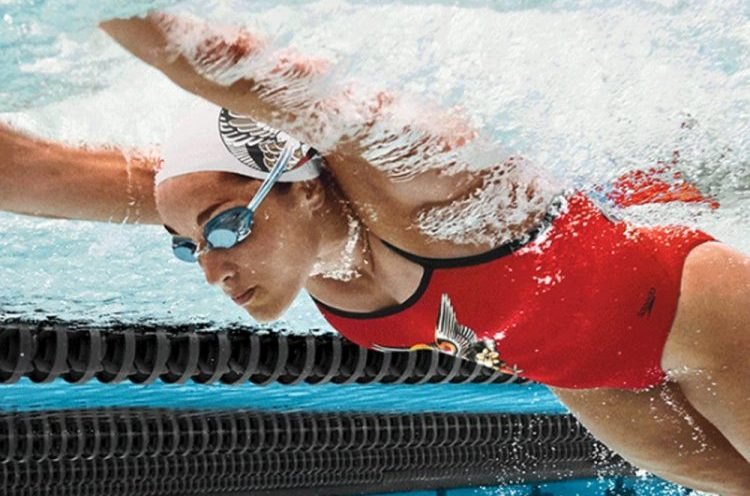Do Swimming Suits Allow You To Be Faster?
The importance of swimming suits – also known as performance, competition, or racing swimsuits – has been one of the hottest topics of conversation in the competitive swimming and lifeguard training world lately.
Over the past decades, professional swimmers have constantly looked to new and innovative swimwear technologies in an attempt to gain benefits and improve their pool time.
British swimmer Rebecca Adlington reportedly said full-body swimsuits amounted to “doping technology,” and FINA quickly introduced a strict set of rules for competitive swimsuits that were applied from January 1, 2010.
We now have a more measured version of the competitive swimsuit, one that enhances the swimmer’s natural abilities, without giving them an unconstrained advantage over the competition. Strict rules are in place regarding materials, fabric weight, water repellent stitching and gluing techniques, body coverage, etc.
These highly technical racing swimsuits, however, are not just for professional swimmers. Anyone can use running swimsuits, from beginners to experienced swimmers. But, are performance swimsuits really worth it, and do they get you faster?
Do Swimming Suits Allow You To Be Faster?
- What is a swimming suit? What makes her better than a standard swimsuit designed for competition? Swimming suits use a range of technologies to reduce drag and improve oxygen efficiency.
- For starters, swimming suits are made from a water repellent material, often referred to as water repellent. This material does not absorb water, which would weigh down the swimmer.
- Swimming suits also use compression for a better fit. This is crucial for swimmers, as a slimmer profile helps streamline them and reduce drag.
- Compression also helps improve circulation, which can improve performance.
- Many wetsuits also lack seams, making them smooth and reducing drag even more.
Psychological Benefits Of Wearing a Swimming Suit
Another advantage of swimming suits that is important to remember is the psychological role they play. In addition to giving the swimmer certain physical benefits in the water, they also have an effect on the mind.
Whether a swimmer or not, anyone has felt like they’ve become a bit of a superhero when they use something new and shiny. If this new element is also presented as highly technological, it can give stimulation to the brain.
So while a tech swimsuit didn’t get you faster, it does make you feel like you’re going faster – which can cause you to be faster.
Swimming Records Thanks To Swimming Suits
So how quickly can a technological swimsuit be beneficial? A number of world records set have been awarded, at least in part, to a swimming suit.
For example, at the 2009 Worlds in Rome, Paul Biedermann gained four seconds in his 200m freestyle (compared to the previous year) and set a new world record, which is still in place.
Why are the prices of swimming suits changing so much? With thousands of swimmers around the world competing in different age groups and skills, there is a great demand for low-level performance wetsuits, just as much as elite wetsuits costing several hundred dollars.
Manufacturers such as Maru, Mad Wave, Yingfa, and others are all developing more economical wetsuits aimed at lower-level swimmers.
Now, these suits aren’t slow, they usually don’t have as many performance-enhancing features as the elite-level suits.
What Are The Rules For Fina-Approved Competition Suits?
Since 2009, the competition rules for swimsuits have changed – several times in fact. FINA, the international governing body of competitive swimming, has banned, legalized, and then once again banned competitive suits that cover the entire body.
Today, FINA-approved competition suits must not extend below the knee. Jammers for men should not go beyond the belly button, while the partial wetsuit that extends to the knee for women should not cover the neck or go beyond the shoulders.
Do The Competition Suits Make The Difference? Our Observation
Competition suits have been proven to get you faster. Indeed, they have broken records, they have been developed in laboratories by professionals and huge budgets have been invested for their creation.
Scientific research into the effect of competitive suits on resistance and speed in water has also yielded positive results. This Brazilian report on the effect of wearing a swimming suit on a swimmer’s hydrodynamic resistance compared the performance in the water of swimmers wearing underwear, standard swimsuits, and swimming suits of competition.
The report concluded:
- The total hydrodynamic resistance when the swimmer was not wearing a swimsuit (light underwear) was greater than the resistance of the swimsuit conditions (+ 40%) where the values were very similar, although the swimsuit of the new generation presented slightly lower values of drag coefficient and drag force -1%).
- The results allowed us to conclude that the swimsuits exhibited performance-enhancing characteristics compared to wearing the swimsuit alone (only light underwear).
- The standard swimsuit presented swimmers with hydrodynamic advantages similar to those of prohibited swimsuits.
- The possible hydrodynamic effects of wearing a swimsuit appeared to be particularly related to factors affecting the effects of pressure rather than friction.”
- The more expensive wetsuits are for competitive swimmers who need to save precious time on their records while maximizing their physical capabilities and supporting their muscles.
- These characteristics will allow the elite swimmer to perform at the highest level throughout his race.
- The most advanced current swimming suits for racing have been designed to enhance the swimmer’s natural abilities in every way, respecting the strict criteria set by FINA.
- When you compete at a high level, every millisecond counts. It can make the difference between finishing first and second or the difference between a new record or a personal best.





















